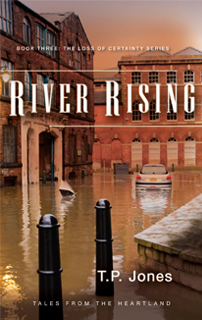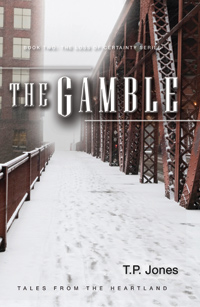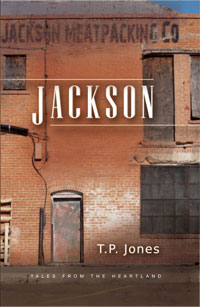 |
||||
 River Rising by T.P. Jones (Author)  The Gamble by T.P. Jones (Author)  Jackson by T.P. Jones (Author) |
Jackson, Book #1 in The Loss of Certainty Trilogy
And the choice was as obvious as the alternatives were stark. I'd write. That's what I'd always wanted to do. The teaching career had been, in a real sense, the way of establishing an adult life for myself, and now that I had done that, now that I had the self-control and perseverance necessary, I was prepared for the rigors of fiction writing. To begin, I needed to find a Midwestern city (I wanted to set the novel in the heart of the country) where I might become a participant-observer in the local government. Elisabeth wrote herself, having published a number of short stories, and so sympathized with my plight. (The math-teaching sidetrack had always rather mystified her.) We decided on a move to the Midwest so that I might do my research. During our time there, Elisabeth would perhaps live where I lived or perhaps not. (She was partial to large university towns and wound up in Madison, Wisconsin.) And then, the research completed, we would continue on to Berkeley, California, back to the Bay Area. After the semester, we traveled around the Upper Midwest, looking for a small city on a big river. Dubuque, Iowa (pop. 60,000) on the Mississippi, the downtown on a floodplain backed by a palisade of bluffs, fit my needs to a T. I approached city officials, and so long as I didn't use the name Dubuque in my book, they were willing to let me spend time in various departments. The local newspaper wrote up a story about my project, and in the summer of 1984, I moved to Dubuque (Elisabeth to Madison, WI, ninety miles away) and the research began. What started out as a single novel and a four-year project became a trilogy and took 18 years to complete. And what started as a novel about local government became finally a skein of narratives about the people and organizations in a place like Dubuque, the life of a community in crisis, when the sorts of changes that people are most reluctant to make become the only changes that have a chance of succeeding. The first volume unfolds, during the fall, while the very earliest conditions foreshadowing a massive spring flood make an appearance. At the moment, however, that's the least of the community's worries. It is a time of economic stress, not unlike our own, unemployment having spiked and one of the largest local businesses, a meatpacking plant, on the point of going out of business and destroying more than 2,000 jobs. How to save the company -- indeed, whether any attempt should even be made to save it -- becomes the subject of intense conflict. The employees are given the chance to buy the company, apparently the only way to avoid bankruptcy, but to do so they must risk more than their jobs. Charges are leveled at CEO Skip Peterson, claiming that he is not attempting to save the firm but merely wishes to blame the employees for its inevitable collapse. A take-no-prisoners national meatpacker moves in intent upon picking over the bones of the failing company. More radical changes are proposed and fought over. Life savings, friendships, reputations -- all are at stake. And finally a day is set when a decision, once and for all, must be made. Why Tom chose Dubuque, Iowa as his setting When I began to think about this project, wishing to explore some of the issues central to American experience, the Midwest seemed the logical choice as a setting, for geographical reasons certainly but also because it is a region where questions about core American values lie eternally near the surface of life.I knew two things about the narrative – that it would involve day-to-day workings of a city government and that the climactic event would be a large-river flood. Needing a city on a sizable river, Elisabeth and I set out on a pilgrimage around the Midwest looking for such a place. Novels being visual, the movies we mount on the screen inside our skulls, even before I’d found an actual city where I might do my research, I already knew what it looked like – the downtown on a floodplain backed by a palisade of bluffs. We had looked at nearly a dozen communities, some of which would have sufficed but none of them knocking my socks off, and were down to our last few possibilities when we entered Dubuque, coming from Waterloo to the west and entering through a high bluff, the city spread out below and the Mississippi River beyond. It was as if, in my fantasies over what my town should look like, I’d been channeling Dubuque. The place was perfect, the only question whether I could work out a deal with city officials that would give me the kind of access I’d need to write a creditable book. Fortunately, the people I encountered at city hall were encouraging and a deal soon struck. As a footnote, however, I should add that in one respect, which seemed significant at the time, the city didn’t meet my expectations. There was a high floodwall and levee system protecting it, built after a devastating flood in 1965 and intended to protect Dubuque against foreseeable disasters. My first impulse was to pretend the system didn’t exist, but I quickly realized that that would be silly. What was the point in coming to Dubuque and then immediately starting to ignore what was there. So I left the floodwall and levees standing, and set about getting to know the place which was already so familiar but about which I knew so little. |
|||
| Copyright 2009 TheLossofCertainty.com, All Rights Reserved. |
||||